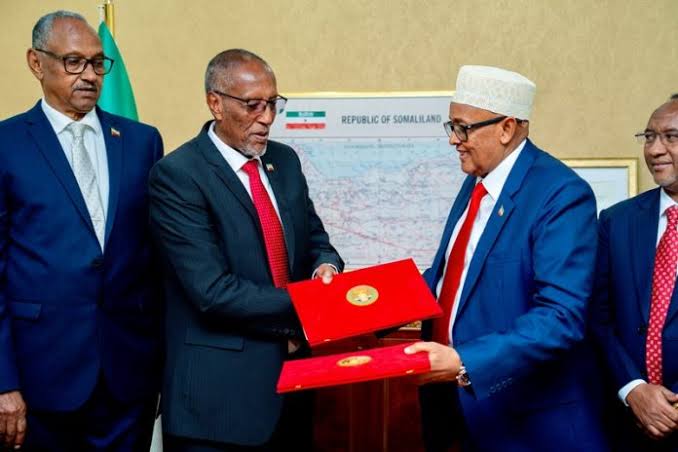Facebook Twitter (X) Instagram Somali Magazine - People's Magazine
Somaliland, the self-declared independent region of Somalia, has inaugurated its new president, Abdirahman Mohamed Abdullahi, after a November election that bolstered its quest for global recognition. The ceremony, held in Hargeisa, came against the backdrop of a recent agreement between Somalia and Ethiopia to resolve disputes through dialogue.
New Leadership in Somaliland
Abdirahman Mohamed Abdullahi, a seasoned politician and former opposition leader, was sworn in as Somaliland’s sixth president, succeeding Muse Bihi Abdi. Abdullahi, representing the Waddani Party, secured over 50% of votes in the Nov. 13 presidential election. The peaceful electoral process, which saw significant voter turnout, was praised as a testament to Somaliland’s democratic progress.
In his inaugural address, Abdullahi pledged to intensify efforts to achieve international recognition, emphasizing Somaliland’s legal and historical claims to sovereignty. He also committed to bolstering the region’s foreign policy to align with its strategic goals.
Somaliland’s Quest for Recognition
Somaliland declared independence from Somalia in 1991 following years of conflict. It has since maintained a stable political environment, its own government, currency, and security forces, distinguishing itself from Somalia’s ongoing struggles with al-Shabab insurgency. However, Somaliland remains unrecognized by the African Union, the United Nations, and other states, with Somalia continuing to claim it as part of its territory.
The region’s push for recognition gained momentum in January when Somaliland signed an agreement with Ethiopia to lease coastal land for a marine base in exchange for Ethiopia’s recognition of its independence. The deal has sparked tensions with Somalia, which views it as a violation of its sovereignty. Abdullahi, during his campaign, criticized the agreement for its lack of transparency and vowed to review such arrangements to ensure they align with Somaliland’s interests.
International Engagement and Challenges Ahead
At the inauguration, U.S. Ambassador to Somalia Richard H. Riley commended Somaliland’s commitment to democracy and expressed optimism for collaboration with the new administration. “The people of Somaliland have set an example of democracy not only for this region but for Africa and the world,” Riley remarked.
Abdullahi’s administration faces significant challenges, including ongoing conflict in Somaliland’s Sool region and navigating regional agreements like the Ethiopia deal. His government is also expected to strengthen alliances to further the region’s recognition goals.
Regional Context and Global Implications
The inauguration coincided with Ethiopia and Somalia agreeing in Turkey to hold “technical talks” over disputes arising from Somaliland’s agreements with Ethiopia. The discussions are part of broader efforts to reduce tensions in the Horn of Africa, a region that remains geopolitically sensitive.
Somaliland’s continued stability and democratic progress, juxtaposed with Somalia’s struggles, have earned it admiration. However, achieving formal recognition remains elusive due to international adherence to Somalia’s territorial integrity.
Conclusion
Abdirahman Mohamed Abdullahi’s leadership ushers in a new chapter for Somaliland, with renewed vigor for its push toward international recognition. The peaceful transition of power and democratic resilience showcased in the recent election have highlighted Somaliland’s unique position in the Horn of Africa. As the region navigates internal challenges and complex geopolitical dynamics, the international community’s engagement will play a critical role in shaping Somaliland’s future.

